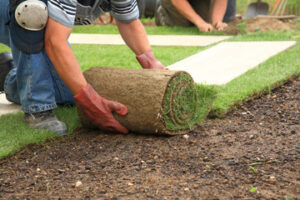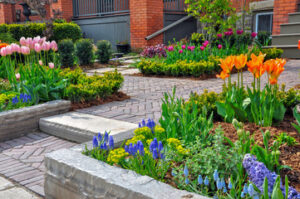Landscaping Baltimore is the art of designing and converting outdoor spaces into beautiful places to relax. It involves planning the layout (geometry), establishing planes and transitions, and selecting objects that relate to existing architecture.

Well-done landscaping offers a number of benefits that improve your quality of life. Some of these include: reducing stress, lowering your energy bills, and providing a place for exercise.
Sustainable landscapes reduce the need for chemicals, water and energy, increase biodiversity, provide habitat and strengthen local ecosystems. A well-maintained garden can also help to regulate temperature, control noise pollution and reduce air and water contamination.
Soil is often the most overlooked resource in landscaping, but it is a crucial element to plant health. A properly prepared soil is the foundation to a healthy landscape, so consider using organic amendments that will increase nutrient availability and improve the structure of your soil.
Using native plants is another important aspect of sustainable landscaping. Plants that are adapted to your climate will grow more successfully and require less water than non-native plants. Plants that are native to your region will also attract insects and birds that are natural insect repellents, which will decrease the need for chemical pest controls.
Another way to decrease your environmental impact is by choosing a drought-tolerant or low-water-use plant for each area of your yard. This will not only reduce your water usage, but it will also help to protect the environment by reducing the amount of freshwater used in irrigation.
A sustainable landscape also includes a variety of eco-friendly features such as the use of recycled materials and the addition of a rainwater harvesting system to collect gallons of water for your garden on dry days. Another great feature is creating habitats for wildlife that will allow you to enjoy watching squirrels, birds and butterflies frolicking in your yard.
The last but most obvious benefit of sustainable landscaping is that it requires minimal maintenance, so you won’t have to use any polluting power equipment or harmful chemicals to maintain your yard. You can further reduce your environmental footprint by composting your nutrient-rich yard waste and using reclaimed wood for outdoor structures such as retaining walls or walkway pavers. You can even turn your waste into a beautiful and functional landscape by planting shrubs, flowers and trees with the discarded soil from your garden beds. This enables you to create a garden that looks like it came out of a magazine, while increasing your property value and curb appeal.
Health Benefits
In a world where people spend most of their time indoors, a well-maintained landscape provides a place to relax and unwind. Beautiful flowers, green grass, and healthy trees and shrubs offer a welcome respite from the hustle and bustle of everyday life. Landscapes can also boost curb appeal, increase property value and create a sense of community. But did you know that landscaping has health benefits too?
A recent study found that the mere presence of greenery can lower blood pressure and reduce the stress hormone cortisol. Walking through a manicured landscape also encourages physical activity. In addition, the bacteria in soil (Mycobacterium vaccae) mimics the effects of Prozac and causes a positive mood change by stimulating serotonin production. So when you plant and maintain a landscape, you’re actually improving your mental health and reducing your risk for depression and anxiety.
Home landscapes provide a personal sanctuary and place to rest and recuperate. The plants in a yard can cleanse the air of pollutants, reducing the risk for respiratory conditions and allergies. They also provide habitat for birds, insects, and other wildlife.
In addition, a landscaped property reduces the need for harmful pesticides. In fact, studies have shown that homes with yards containing pollinator-friendly plants experience a 50% reduction in the use of pesticides than those without.
In order to reap the many benefits of a well-maintained landscape, homeowners should regularly perform maintenance tasks like aeration and dethatching. These processes help to loosen up the soil and eliminate thatch buildup, allowing water and nutrients to penetrate deeper into the ground. They should also periodically prune broken and sucker branches and remove invasive species, as they can crowd out other healthier plants. By doing these simple tasks, homeowners can enjoy the many health and environmental benefits of a well-designed and maintained lawn. For more information, contact a local landscaping company. They will be able to advise you on the best types of plants and how to care for them. They will also be able to install walkways, patios and other features to enhance the beauty of your property.
Home Value Benefits
A well-maintained lawn and garden will add value to your home. Prospective buyers will be more likely to pay a higher price for your house if it has a stunning landscape that is professionally maintained.
Landscaping can be a big investment, but it’s one that will pay off in the long run. You may not be planning to sell your home any time soon, but keeping your yard in good shape will make it easier for you to enjoy the property while you’re living there. Plus, if you ever decide to put your home on the market, a beautiful lawn and garden will give it more curb appeal and increase its value.
Even small landscaping projects like adding mulch, mowing the lawn, pruning shrubs or removing dead vegetation can greatly improve your property’s curb appeal. In fact, studies show that a well-maintained home landscape can increase your property’s value by up to 15 percent.
When you choose low-maintenance, native plants for your softscapes, you’ll save yourself a lot of work and money in the long run. Unlike traditional turf grass, native trees and shrubs don’t require fertilizing, pesticides, soil amendments, mulch applications, annual mowing or watering. Plus, they’ll help to keep your home cool in the summer and will reduce your energy bills.
The right landscape can also protect your home from wind and sun damage, lower your insurance premiums and prevent foundation problems. Moreover, if you create privacy with landscaping elements, it can increase your home’s value significantly.
If you’re looking for a way to boost your property’s value, consider hiring a professional landscaper near you to do some hardscaping and/or softscaping.
Aesthetic Benefits
There is no question that landscaping can be very beautiful, adding a visual delight to the property. This is especially true of professionally-designed landscapes that are carried out to a high standard. The beauty of the landscape may be obvious to others, but it also can have a positive psychological impact. In fact, studies show that people who spend time in or even just look at natural landscapes experience a positive boost to their mood and an increased sense of well-being.
A well-designed landscape can serve a variety of aesthetic functions, from creating focal points to providing a range of colors and textures. This is a great way to create a sense of harmony and unity in the garden and help to draw attention to certain features of the property. For example, in this shady space we incorporated a wide variety of plant materials that add contrasting colors to the area from purple-leafed Japanese Maples to soft greens of Boxwood and Heuchera to vibrant yellow-green Hakonechloa grass. This diversity of color and texture in a shady space maximizes the aesthetic function of the landscape.
Landscaping can also serve to enhance the visibility of a home in a neighborhood and increase its curb appeal, which is especially important in a competitive real estate market. In addition, it can improve the functionality of a property by creating areas for outdoor living and by adding elements that can prevent soil erosion and flood damage.
One of the most important functions of landscapes is to provide a natural setting for social interaction. In this way, residential landscapes can foster family bonds and community spirit by serving as a backdrop for weekend barbecues or spontaneous evening chats among neighbors. The tranquility of a well-designed garden can also promote relaxation and provide an escape from the busyness of everyday life.
Landscaping is an important investment for any homeowner. But it’s important to remember that while the financial return on a landscape project may not be as immediate as an investment in a savings account or stock, the long-term benefits can be very worthwhile for your family and your neighborhood.
